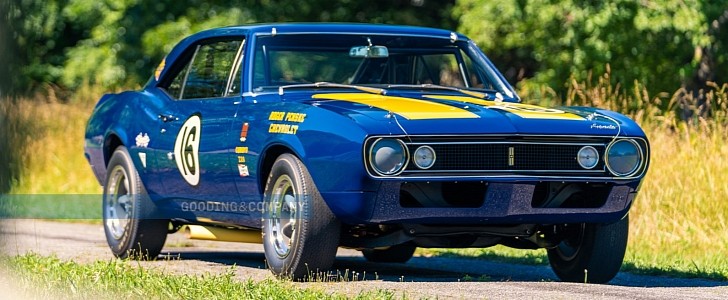The history of the Camaro Z/28 can be traced back to 1966, the year when Chevrolet introduced its competitor for the Ford Mustang. It came to be as an option code for a "race-ready" Camaro, essentially an alternative to the Shelby GT350. However, the package was not advertised and it remained unknown to most buyers. As a result, Chevrolet sold only 602 Z/28s for the 1967 model year.
As word got out that Chevy was secretly selling a beefed-up, track-oriented Camaro, sales jumped to more than 7,000 units in 1968 and more than 20,000 examples in 1969. But while regular customers were driving them on public roads, Chevrolet was racing Z/28s in the Trans-Am series.
Following a disastrous first season with the Corvair, Chevrolet turned to the Camaro for the 1967 championship. Six of the first Z/28s ever built were delivered to the Roger Penske Racing Team. The Sunoco-sponsored team went on to dominate the series for two years in a row, winning the "Over 2-liter" class with legendary race car driver Mark Donohue behind the steering wheel.
One of the six Chevrolet Sunoco Camaros raced by Team Penske is now up for grabs. And it's not just any Z/28. It's chassis no. 7N163378, the first Chevrolet Camaro to ever win a professional race. It's also the first Sunoco Camaro ever built and only the 14th Z/28 to leave the Chevrolet factory in 1967.
Classic race cars are often in bad shape after years of racing and sometimes even more years of improper storage. But not this Camaro Z/28. The Trans-Am veteran has been meticulously restored by Chevrolet expert Kevin Mackay and it looks like it just left the factory. Perhaps even better than that.
The Z/28 was restored to the specification of its first victory, so it's wearing the iconic blue livery with bright yellow stripes, "Roger Penske Chevrolet" and "Sunoco" decals, plus no. 16 roundels on the doors and hood.
The race-spec coupe is powered by its original 302-cubic-inch (5.0-liter) V8. Developed specifically for the Trans-Am series, it features a three-inch stroke crankshaft with a four-inch bore, an aluminum intake manifold, and a four-barrel 780 cfm Holley carburetor.
The street-spec Z/28 was underrated at 290 horsepower back in 1967, with actual output surpassing the 360-horsepower mark with the optional dual-four barrel carbs. The race-spec Z/28 was notably more powerful than that, laying around 440 horsepower on the ground.
One of the cars that brought Chevrolet its first win in the Trans-Am series, this Camaro Z/28 saw action at the track until 1969, when Donohue won its second consecutive title.
Both Donohue and Penske changed teams to American Motors Corporation in 1970 and won their third championship in 1971. Donohue, who also competed in endurance racing, IndyCar, NASCAR, Can-Am, passed away in 1975 following a crash during a practice session for the Austrian Grand Prix.
Arguably the most iconic race-spec Camaro out there - and raced by an International Motorsports Hall of Fame driver - the Z/28 will cross the auction block via Gooding & Company at the 2021 Pebble Beach Auctions, scheduled on August 14-15. The Sunoco-liveried Chevy will probably fetch more than $500,000.
Following a disastrous first season with the Corvair, Chevrolet turned to the Camaro for the 1967 championship. Six of the first Z/28s ever built were delivered to the Roger Penske Racing Team. The Sunoco-sponsored team went on to dominate the series for two years in a row, winning the "Over 2-liter" class with legendary race car driver Mark Donohue behind the steering wheel.
One of the six Chevrolet Sunoco Camaros raced by Team Penske is now up for grabs. And it's not just any Z/28. It's chassis no. 7N163378, the first Chevrolet Camaro to ever win a professional race. It's also the first Sunoco Camaro ever built and only the 14th Z/28 to leave the Chevrolet factory in 1967.
Classic race cars are often in bad shape after years of racing and sometimes even more years of improper storage. But not this Camaro Z/28. The Trans-Am veteran has been meticulously restored by Chevrolet expert Kevin Mackay and it looks like it just left the factory. Perhaps even better than that.
The Z/28 was restored to the specification of its first victory, so it's wearing the iconic blue livery with bright yellow stripes, "Roger Penske Chevrolet" and "Sunoco" decals, plus no. 16 roundels on the doors and hood.
The race-spec coupe is powered by its original 302-cubic-inch (5.0-liter) V8. Developed specifically for the Trans-Am series, it features a three-inch stroke crankshaft with a four-inch bore, an aluminum intake manifold, and a four-barrel 780 cfm Holley carburetor.
The street-spec Z/28 was underrated at 290 horsepower back in 1967, with actual output surpassing the 360-horsepower mark with the optional dual-four barrel carbs. The race-spec Z/28 was notably more powerful than that, laying around 440 horsepower on the ground.
One of the cars that brought Chevrolet its first win in the Trans-Am series, this Camaro Z/28 saw action at the track until 1969, when Donohue won its second consecutive title.
Both Donohue and Penske changed teams to American Motors Corporation in 1970 and won their third championship in 1971. Donohue, who also competed in endurance racing, IndyCar, NASCAR, Can-Am, passed away in 1975 following a crash during a practice session for the Austrian Grand Prix.
Arguably the most iconic race-spec Camaro out there - and raced by an International Motorsports Hall of Fame driver - the Z/28 will cross the auction block via Gooding & Company at the 2021 Pebble Beach Auctions, scheduled on August 14-15. The Sunoco-liveried Chevy will probably fetch more than $500,000.

